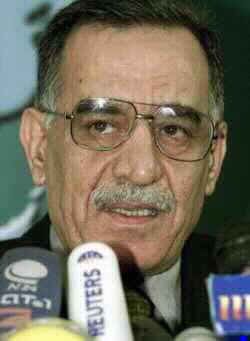A senior Iraqi official on Thursday dismissed as a ridiculous a U.S. newspaper report which cited officials as saying that Islamic extremists linked to al Qaeda had received a chemical weapon in Iraq. The Washington Post had quoted officials, who spoke without White House permission, as saying the information about the transfer came from a sensitive and credible source whom they declined to discuss. General Hussam Mohammed Amin, head of Iraq's National Monitoring Directorate, told a news conference in Baghdad that all his country's stockpiles of chemical weapons had been destroyed in the early 1990s.
"This is a really ridiculous assumption from the American administration because they know very well we have no prohibited material or prohibited activities," he said, when asked about the report.
Citing two officials with first-hand knowledge of the report and its source, the Washington Post reported that U.S. analysts suspect the transfer involved the nerve agent VX and that it was smuggled through Turkey last month or late in October.
"The way we gleaned the information makes us feel confident it is accurate," one of the officials told the paper. "I throw about 99 percent of the spot reports away when I look at them. I didn't throw this one away."
The newspaper quoted one official as saying that the transaction involved Asbat al-Ansar, a Lebanon-based Sunni group.
"NO HARD EVIDENCE"
The Post said Gordon Johndroe, spokesman for Homeland Security Director Tom Ridge, was the only official authorised by the White House to discuss the reported chemical transfer on the record.
"We are concerned because of al Qaeda's interest in obtaining and using weapons of mass destruction, including chemical, and we continue to seek evidence and intelligence information with regards to their planning activity," Johndroe told the paper.
"Have they obtained chemical weapons?" Johndroe said. "I do not have any hard, concrete evidence that they have."
Pressed on whether the information referred to a nerve agent, Johndroe said: "There is no specific intelligence that limits al Qaeda's interest to one particular chemical or biological weapon over the other."
Sean McCormack, spokesman for the White House National Security Council, subsequently told reporters: "We have no credible evidence to suggest that al Qaeda or related groups have succeeded in acquiring or developing chemical weapons."
White House spokesman Ari Fleischer said: "We have longstanding had concerns about Iraq providing weaponry to al Qaeda, and of course we know that al Qaeda is seeking it. But beyond that, I just don't get into intelligence information."
Defense Secretary Donald Rumsfeld told television interviewers there was no question terrorist networks such as al Qaeda had sought access to chemical, biological and radiation weapons.
"I have not seen the article. I have seen other information over a period of time that suggests that could be happening," Rumsfeld said on ABC-TV.
In an interview on NBC-TV, Rumsfeld said the United States had warned Iraq and others that "that anyone involved in weapons of mass destruction will wish they hadn't."
The Washington Post said other spokesmen, who spoke on condition of anonymity, said the principal source on the chemical transfer was uncorroborated and that indications it involved a nerve agent were open to interpretation.
Iraq has said it has no chemical, biological or nuclear weapons
PHOTO CAPTION
Hussam Mohammed Amin, head of the Iraqi National Monitoring Directorate, speaks during a news conference in Baghdad, December 12, 2002. U.N inspectors scrutinized more suspected weapons sites as an Iraqi daily denounced a U.S. pact to upgrade military bases in Qatar as a paranoid American quest for global hegemony. REUTERS/Akram Salih
- Dec 11 9:27 PM ET
- Author:
& News Agencies - Section:
WORLD HEADLINES


 Home
Home Discover Islam
Discover Islam Quran Recitations
Quran Recitations Lectures
Lectures
 Fatwa
Fatwa Articles
Articles Fiqh
Fiqh E-Books
E-Books Boys & Girls
Boys & Girls  Articles
Articles










